Private Credit – A real solution to low interest rates

The SILC Group
With concerns looming about the possibility of an inflation fuelled market sell-off and the eventual tightening of monetary policy at the forefront of investors’ minds, where can yield- seeking investors turn?
I have read suggestions that hybrid securities (commonly referred to as ‘hybrids’) present a viable solution to this asset allocation conundrum that investors are faced with in the current low interest rate environment. Essentially hybrids, as the name suggests, are a single security that combines the features of the two most commonly held securities, equities and bonds. As I highlighted in my previous article (linked below), sophisticated investors may want to consider diversifying into uncorrelated investment asset classes. And in the following, I will explore the Private Credit (also known as Private Debt) market.
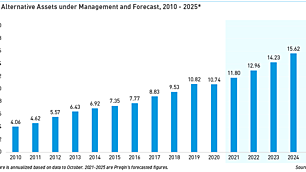
Why Private Credit?
In conjunction with low interest rates and volatility in traditional fixed-income investments, this emerging alternative asset class is poised to provide potentially favourable returns for progressive yield-seeking investors. As illustrated in Figure 1, second only to private equity, the global Private Credit asset class is expected to grow by 72% to US$ 1.5 trillion globally by 2025.
Figure 1: Alternative Assets under Management ($bn), 2020 vs. 2025
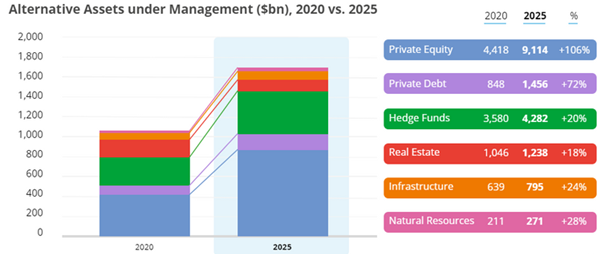
Source: Preqin
Australia’s Private Credit front
In Australia, access to capital over the past decade from traditional banking channels has been constrained for projects, assets, business and commercial enterprises. Tougher bank regulatory requirements have led to a significant decline in traditional bank lending, paving the way for non-bank lenders and Private Credit funds to fill the funding gap left by the traditional banks. As a result, qualifying investors are presented with a compelling opportunity to consider an alternative asset class that may elevate risk-adjusted returns.
Compared with fixed income instruments such as the S&P Australia Investment Grade Corporate Bond Index (3.94% p.a in June 2021), annual returns generated by Private Credit investments can well exceed this, as per Figure 2. The rate of return, and the level of risk, will be dependent on several factors such as the maturity of the borrowing entity, seniority of the debt, quality of security, sector, and term (duration) to name a few.
In line with expected market returns, we have observed generally consistent returns among in our own portfolios by sticking to a strict credit policy when sourcing deals.
Figure 2: Investment Risk/Return Spectrum
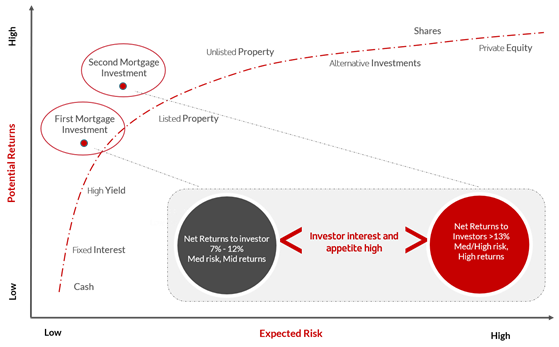
Source: SILC Private Credit Fund.
Figure 2. Investment Risk/Return Spectrum is a stylized chart based on trends and not actual data. The chart is for demonstration purposes only, and it is not intended as a guide for predicting future performances. As with all investments, private lending investments carry risk and should be assessed on a case-by-case basis, taking into account your financial circumstances.
The Australian Financial Review recently reported on research conducted by MaxCap and The University of Technology Sydney, which investigated how Commercial Real Estate Debt (CRED) can help boost alpha and reduce volatility. The AFR article defines CRED as “a fixed income instrument, or loan, secured by commercial real estate where the primary purpose of the loan concerns the use and/or improvement of that asset”. The research compared the performance of a typical investment portfolio with and without the inclusion of CRED. Their findings concluded that over the last 20 years, portfolios with CRED produced higher returns and less volatility than those without.
Private Credit funds and non-bank lenders are providing a growing amount of CRED to borrowers and providing wholesale investors with an opportunity to “be the bank”.
The middle-market opportunity
The financing shortfall created from the structural shift in the banking sector is most apparent in the unlisted private sector, known as the "middle market". Simply put, the banks are focusing their efforts on the big institutions and the mums and dads, and not much in-between.
It is not all bad news for those stuck in the middle, as Private Credit can be more accommodating and flexible to the requirements of credible borrowers, which provides competitive advantages to those sponsors. While interest rates provided by the banks may be lower, structural differences such as higher loan-to-value ratio’s (LVRs) may produce higher internal rates of return (IRRs) which provides the borrower with more capital and the investor with greater returns.
Investors are displaying an increased appetite to deploy capital into the middle market which provides a greater spread of investment assets, a higher level of security in the capital structure and more stable rates of return. This, combined with the opportunity for middle market borrowers, provides for a mutually beneficial outcome to both interest groups.
Private credit funds can be a more efficient and cost-effective avenue of raising debt
Unlike the global Private Credit market, which continues to be dominated by covenant-lite loans, Australian Private Credit funds typically have a higher level of security in the capital structure as loans are provided on a first or second mortgage basis. These structural protections through seniority, security and covenants underpin the overall lower risk profile of the asset class due to the asset-backed nature of investments. At the same time, Private Credit stands to offer additional diversification benefits as loans can be issued to companies and industries that may not be available in public markets.
Private Credit funds can be structured by way of a pooled approach whereby investment managers have the discretion to deploy capital into specific loans within a given investment policy and mandate. Alternatively, via a contributory structure, the investment manager provides investors with the ability to choose the specific loans they want capital to be deployed into (also known as discreet loans) as illustrated in Figure 3.
Figure 3. Discrete loan units fund structure
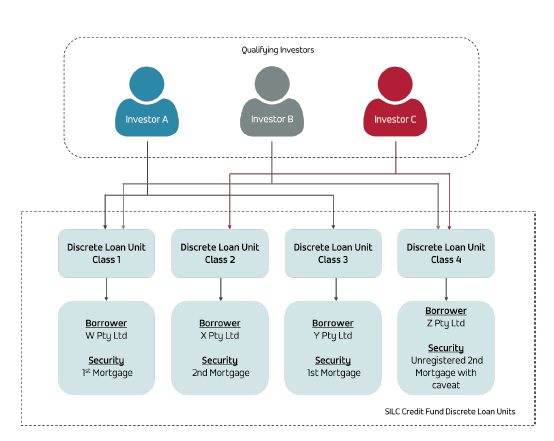
Source: SILC Private Credit Fund
Manager selection is key in navigating the oft-perceived complex Private Credit asset class
Private Credit is generally illiquid, comes with limited transparency and, as a rule of thumb, a medium investment horizon (typically 12-24 months). As dry powder continues to grow, significant investor interest in Private Credit could potentially lead to an erosion of lending standards resulting in increased risks and defaults. To that end, a great deal of know-how is required to carefully select target investments and maintain prudence in allocating capital. It is more important than ever to scrutinize valuations and the creditworthiness of borrowers, as well as to examine business plans in detail and monitor developments.
Varuna Gunatillake, Director of The SILC Group’s Capital Solutions team is familiar with the balancing act of constructing finance agreements with creditworthy borrowers which are tailored to satisfy the needs of investors.
“The demand from the local high net worth and family office investor segments seeking exposure to the Private Credit market has exploded in the last few years.
Below are the steps we take for each loan in The SILC Private Credit Fund.
Figure 4. Steps taken by The SILC Group to set up
a Discrete Loan Unit
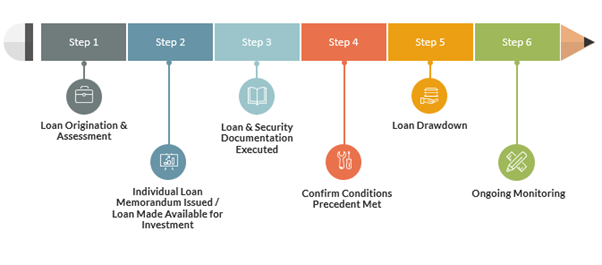
Source: SILC Private Credit Fund
Non-bank lending is here to stay and the banks aren’t standing in the way
Rather than competing for business, banks are open to working with Private Credit funds and alternative financiers as a means of maintaining bank capital requirements. This is resulting in attractively structured debt deals as borrowers have the benefit of procuring funding from both the banks (for a certain portion) as well as private lending avenues in the form of subordinated tranches. This funding approach is a sign that the Private Credit market will continue to thrive and provide sophisticated investors with a unique opportunity to support Australian businesses whilst enjoying some upside.
We are actively engaged with professional and sophisticated investors who are seeking to gain access to an active and growing market segment in Private Credit. Sophisticated investors unsatisfied with the low returns of traditional fixed-income investments could consider diversifying into Private Credit as a way of generating greater returns from their portfolio.
Four reasons to register for Livewire’s 100 Top-Rated Funds Series
Livewire's Top-Rated Fund Series gives subscribers exclusive access to data and insights that will help them make more informed decisions.
Click here to view the dedicated website, which includes:
- The full list of Australia’s 100 top-rated funds.
- Detailed fund profile pages, with data powered by Morningstar.
- Exclusive interviews with expert researchers from Lonsec, Morningstar and Zenith.
- Videos and articles featuring 16 top-rated fund managers.
5 topics

Daniel is a member of the Investment Solutions team at The SILC Group, which offers bespoke investment opportunities, capital raising and trustee services, administration and licensing services for wholesale fund managers.

Daniel is a member of the Investment Solutions team at The SILC Group, which offers bespoke investment opportunities, capital raising and trustee services, administration and licensing services for wholesale fund managers.
